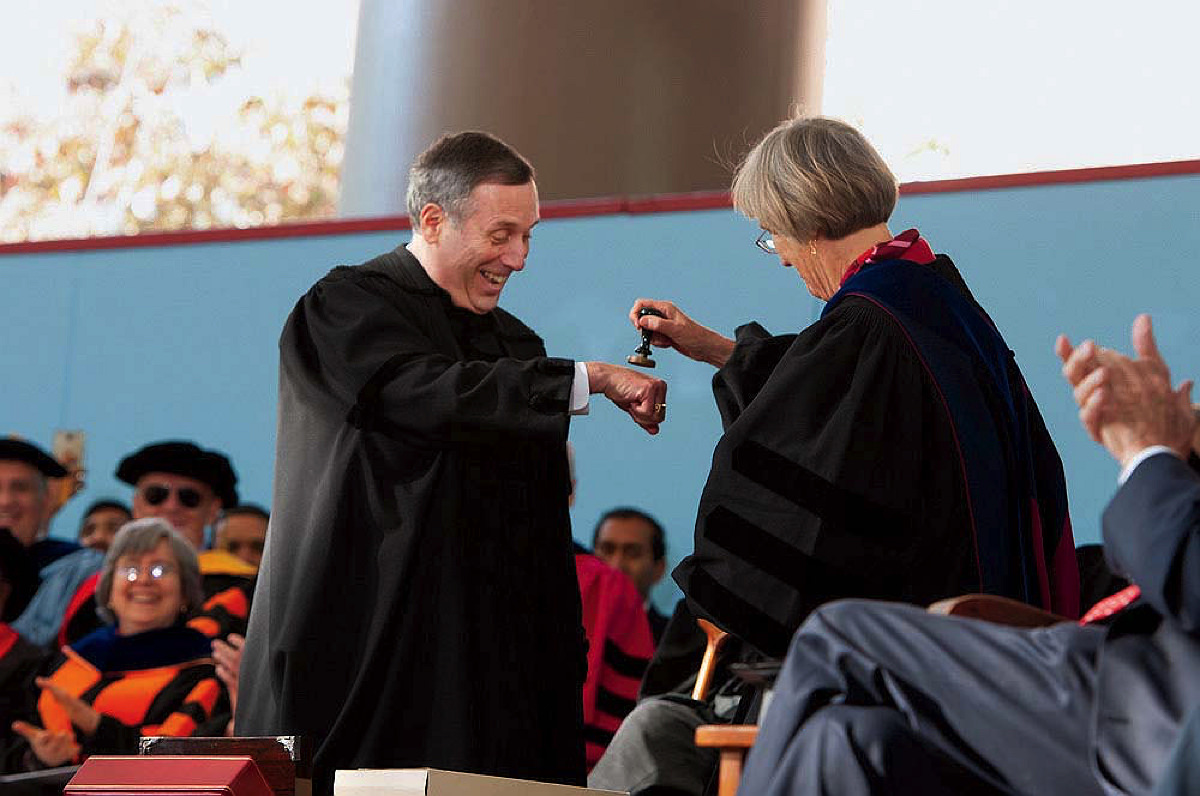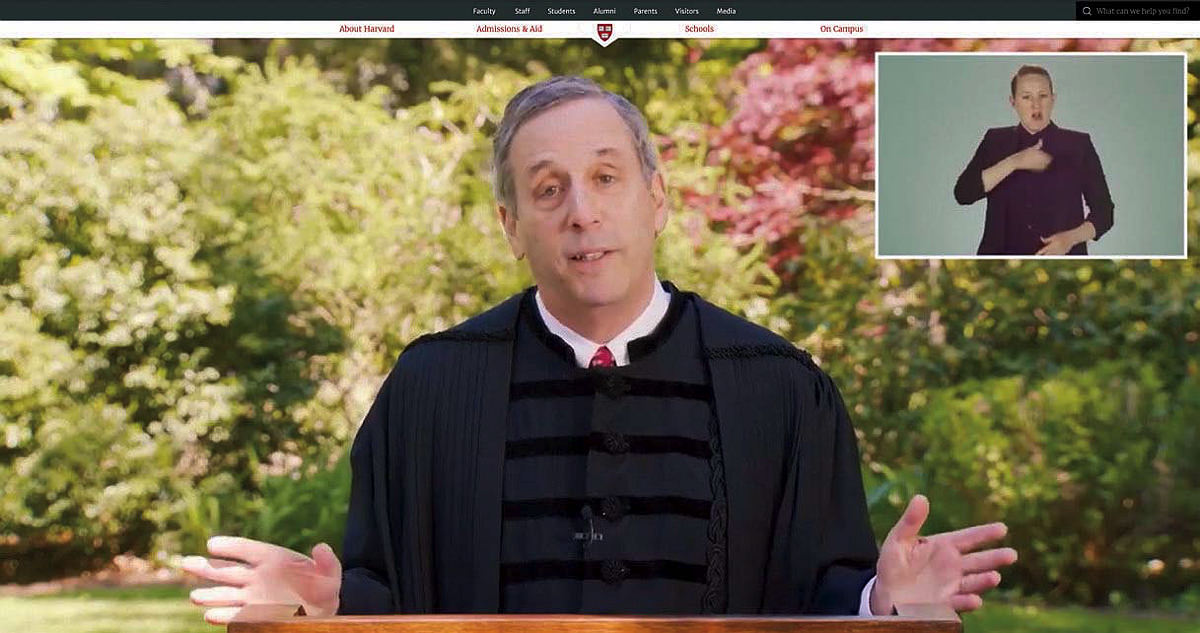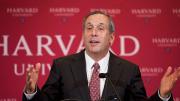Lawrence S. Bacow, Harvard’s twenty-ninth president, announced on June 8 that he would step down at the end of the 2022-2023 academic year, concluding service that began in 2018, when he succeeded Drew Gilpin Faust.
In a characteristically plainspoken email to the community (the subject line was “My Plans”), Bacow wrote of his intention to step down next June 30, concluding 12 years of service on the Corporation, including five as president: collectively, “the privilege of a lifetime.” Putting this latest chapter of his career in perspective, the president—a 1972 MIT graduate who then earned three Harvard degrees (M.P.P.-J.D. ’76, Ph.D. ’78)—continued:
When I first stepped onto this campus as a graduate student in 1972, I never imagined the outsized role Harvard would play in my life.…I was in awe of the place—its history, its reputation, and its impact on all of American higher education. Fifty years later, I am still in awe but for different reasons. It is you that I hold in awe—our students who inspire me with their passion to make the world a better place; our faculty and researchers who push the boundaries of knowledge in just about every field of human endeavor imaginable; our staff who over the past few years have demonstrated resilience, commitment, and dedication that is nothing short of remarkable; and our alumni who shape the world in ways too numerous to mention. I have never been prouder to be part of this University than I am today.

Lawrence S. Bacow with with predecessor Drew Gilpin Faust at his installation, October 5, 2018
Photograph by Jim Harrison
In a separate letter, the Corporation’s departing senior fellow, William F. Lee, and his successor as of this July 1, Penny Pritzker—who will lead the presidential search—wrote of Bacow, “Harvard could not have asked for a better, wiser, more thoughtful, dedicated, experienced, and humane leader through these times of extraordinary challenge and change.”
They cited his pandemic leadership; focus on advancing intellectual priorities; support for educational innovation and the extension of Harvard’s teaching to learners beyond the physical campus; continued renewal of University physical facilities, and stewardship of its financial resources; actions to make the community more inclusive and diverse; encouragement of “candid, mutually respectful discussion of difficult issues among people with different points of view” within the Harvard community; continued emphasis on Harvard’s role in bettering the wider world; and “by word and deed,” Bacow’s role in helping every member of the community “reflect on how we can direct our energies toward causes larger than ourselves.”
Noting his insistence on crediting colleagues for Harvard’s accomplishments, they continued, “[G]reat teams rely on great captains. And—through the tone he sets, through the values he affirms, through the common purpose he cultivates, through the trust he builds, through the initiatives he launches and sustains—Larry Bacow is just that.”
(For a full report, with the Bacow and senior fellows’ messages, see harvardmag.com/bacow-stepdown-22. Information about the search for his successor appears in “Nominations, Please,” below.)
Nominations, Please
On July 7, Harvard Corporation senior fellow Penny Pritzker formally announced the beginning of the search for President Bacow’s successor. Writing on behalf of the search committee (the dozen Corporation members other than the president, plus three Overseers), she outlined traits they deemed important in a new University leader. Pritzker also invited comments on Harvard’s major opportunities and challenges, the qualities and experiences the next president should have, and nominations of candidates for consideration.
Three advisory committees will be formed (faculty, students, and staff), but in the meantime, community members can email thoughts to psearch@harvard.edu; complete an online questionnaire; or write to Harvard Presidential Search Committee, Loeb House, 17 Quincy Street, Cambridge, MA 02138.
The Decision
Neither the decision nor its timing should be seen as complete surprises. In his message to the community, Bacow wrote:
There is never a good time to leave a job like this one, but now seems right to me. Through our collective efforts, we have found our way through the pandemic. We have worked together to sustain Harvard through change and through storm, and collectively we have made Harvard better and stronger in countless ways. I will depart Mass Hall with many fond memories to share with my children and grandchildren, and Adele [Fleet Bacow] and I are looking forward to spending more time with each of them.
In 2017, Bacow, then a member of the Corporation and the search committee, agreed to its request that he come out of semi-retirement to serve as a candidate. (He had been president of Tufts University from September 2001 through July 2011.)
When he assumed his Harvard position, he retained all the senior officers (provost, executive vice president, and so on), rather than engaging in protracted searches to restaff: perhaps a hedge against a relatively short presidency. And there has been no sign of planning for a capital campaign, which would have had to be well under way by now had Bacow intended to launch one—the conduct of which is a hallmark of essentially every university presidency today.
In late May and early June, Bacow presided over the in-person 371st Commencement, the Commencement celebration for the classes of 2020 and 2021 (who had graduated online), and the first Alumni Day—all emotional occasions for marking progress against COVID-19 and the cautious return to near-normalcy as this past spring unfolded.
Assessing the Presidency to Date
It is premature to take stock of a presidency that continues through next June, but certain themes are already clear.
• The pandemic president. The first, of course, is the unexpected and sweeping impact of COVID-19 and the president’s response—beginning with his decision on March 10, 2020, to end residential operations through the academic year 2020-2021 of remote teaching; and then moving carefully toward full operations during the past academic year.
Early in the pandemic, it merits noting, Bacow, who suffered a serious infection of the heart lining in 2004 and is immunocompromised, endured a significant COVID-19 infection (as did his wife, Adele), followed by a breakthrough, milder infection this spring (ditto for his wife). Thus, in addition to the hard work of making difficult pandemic-era decisions for the University community, Bacow had very direct experience of what was at stake.
• The personal presidency. That fed into a second theme: Bacow’s approachable style of leading. Throughout his time at the helm of this large, decentralized, and in many ways impersonal place (much larger and more decentralized than Tufts or MIT, his prior academic homes), Bacow reached out to members of the community. He spoke openly about his family background and his Jewish faith. He urged Harvardians near and far to be solicitous of one another at times of social separation, fear, and loss. And he communicated privately with a wide array of contacts, sharing support and extending consolation—typically signing off, “All the best, Larry.” By all accounts, that empathy has been part of his makeup throughout his life, and has, as a result, been characteristic of his leadership throughout his career.
When he had to explain hard decisions, he modeled the behavior he often talks about. His emails about major pandemic policies were typically co-signed by Alan Garber, the provost; Katie Lapp, the executive vice president; and Giang Nguyen, the executive director of Harvard University Health Services. Emphasizing collective responsibility—the actions individuals had to undertake in order to protect public health—he and his colleagues repeatedly urged members of the community to respect others’ tolerance for risk, differing family health circumstances, and experiences of loss and grief.
And modeling his constant exhortation to members of the community to think about the good they can do beyond Harvard, he was proud that the discoveries underpinning two COVID-19 vaccines came from University scientists’ labs.
Finally, like every effective leader, Bacow pointed toward the future. He expressed hope that the pandemic had taught the institution what it could do, and how it could change, when necessary. Thus the prompt pivot to online teaching, the experiments with online degrees, and the collaboration across formerly inviolable boundaries to make things happen, seemingly overnight, in this most tradition-bound of places. “Institutions tend to be organized to perform tasks they are currently performing,” he wrote in his doctoral dissertation. No one wants to repeat the experience of the pandemic, ever, but the sense of new possibilities might well linger, with lasting effect, after this leader has left office.
Beyond COVID-19
Even operating remotely from Mass Hall, Bacow attended to other institutional priorities. Given his commitment to diversity and inclusion, it came as no surprise that he was a fierce critic of the Trump administration’s efforts to clamp down on international students studying at American institutions.
Internally, Bacow focused on modeling a diverse Harvard, with black women serving as deans of the Faculty of Arts and Sciences (FAS), the schools of education and public health, and the Radcliffe Institute; a woman dean of the design school; a black chief of the Harvard University Police Department and a Hispanic vice president for human resources; and the appointment of the University’s first chief diversity and inclusion officer. In April, the University committee he created issued its sweeping report on Harvard’s engagement with slavery and recommendations for ameliorative actions. He has passionately made the case for a diverse student body, and the procedures necessary to create it, as the legal challenge to Harvard College’s consideration of race in its holistic admissions reviews proceeds to the Supreme Court this fall. And he has chosen as Commencement speakers two women heads of state (Angela Merkel and Jacinda Ardern) and a woman who has been the distinguished leader of three academic institutions (Ruth Simmons)—including at Brown, where she pioneered a critical inquiry into that university’s past connections to slavery.
A champion of free speech and open, reciprocal discourse at a time of increasingly simplistic and vitriolic national politics, Bacow has reminded the community to model something better. At Commencement on May 26, he emphasized to members of the class of 2022 that their success depends on their humility, openness, and responsiveness to others.
In operational terms, Bacow created the Harvard Allston Land Company to pursue commercial development of the “enterprise research campus” across Western Avenue from Harvard Business School, recently approved by Boston regulators. Despite nearly nonstop pandemic planning and precautions, he was able to make progress on FAS’s quantum science initiative; a multi-year, half-billion-dollar, interdisciplinary research program on neuroscience and artificial intelligence; and a new, University-level institute to encourage research and teaching on climate change and sustainability (for which $200 million of support has been secured; see the full report here)—all pillars of future discovery and learning.
What Lies Ahead
Perhaps the greatest immediate gift Bacow bestows on any successor is an institution with sound finances, despite pandemic uncertainties. After the significant operating surpluses the University achieved in fiscal years 2020 and 2021, it would not be surprising to see more black ink when the fiscal year ending this June 30 is reported next fall: a significant advantage for deans who hope to invest in core academic functions.
In the meantime, during his final year in office, President Bacow is pursuing the Allston enterprise campus development, and continued planning for the new American Repertory Theater, also to be sited across the Charles. On the Cambridge side of the river, the new home for the economics department, funded by a gift from Pritzker, is a high priority. The report on the legacy of slavery came with an extraordinary $100-million commitment, endorsed by all the Corporation members. Having initiated that program, Bacow will likely oversee the steps toward implementing the recommended actions. And in light of the changing circumstances facing graduate students, who are key to the institution’s and faculty members’ research ambitions, it would not be surprising to see a final-year emphasis on graduate fellowships and aid.
As he pursues that work, of course, the other Corporation members will launch the search for his successor.
From the governing boards’ perspective, a little longevity in Mass Hall might be a very good thing. Counting the final years of Neil L. Rudenstine’s tenure, and Bacow’s successor, Harvard, which will then have had 30 presidents during nearly four centuries of operation, will have been led by six of them just since the beginning of this millennium. Looking ahead, a successful next president might be expected to serve nearly to the University’s four-hundredth anniversary, in 2036.
That new president will be faced with setting strategy for the institution; no doubt, with pursuing new resources to implement the strategy, through a gargantuan fundraising campaign; coping with constraints on admissions practices likely to result from the Supreme Court ruling in the Students for Fair Admissions litigation (an opinion that might come down as a new president is settling in); probably rebuilding her or his Mass Hall staff; scurrying to complete unfinished business (case in point: helping FAS find nearly $1 billion to complete House renewal), all while managing costs—perhaps amid a recession; and navigating an increasingly toxic political environment and the many attacks on elites, higher education—or, best of all, elite higher education.
Harvard’s search takes place amid others. Research institutions with presidential openings include Columbia, MIT, New York University, Tufts, and the University of Michigan.

Bacow led Harvard through COVID-19, including the 2020 online graduation.
Screenshot by Harvard Magazine
As the search begins, Bacow might recollect that the events of late May and early June brought tens of thousands of students and recent graduates, family members and friends, and longer-term alumni back together with those they love, and on ground that has become hallowed for all of them. Having made so many families so happy, he has now set a path back to more time with his own—including Adele Bacow, their two sons and their families, and the Bacows’ four grandchildren. Given the service he has rendered, under extraordinary circumstances, the University community can only take pleasure in that prospect.







